Portable solar panels or Hand-crank chargers, which is better for the outdoors?

More and more people are beginning to realize that the use of electronic devices cannot be given up as part of a survival plan.
In the past, smartphones, GPS, and other small electronic devices were seen as burdens in emergencies, mainly because they depended on electricity, which meant they were likely to be useless without power.
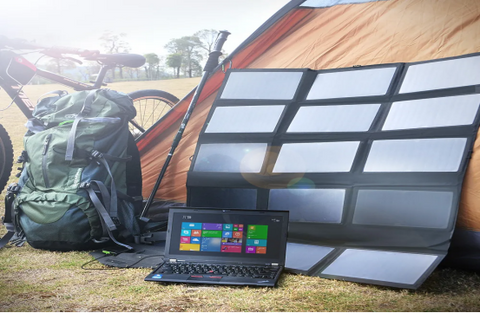
Thanks to the development of modern technology, it is more and more convenient to use electricity in different situations.
Hand-cranked chargers and solar panels, which are used for outdoor emergency use, are very convenient tools for taking electricity, and they are both excellent tools for survival purposes.
As a lover of outdoor sports, do you know which one is more suitable for your needs?
First, the working principle of the hand generator:
Hand-cranked chargers work exactly the same way as wind turbines or hydroelectric dams, albeit on a much smaller scale, generating electricity by turning a turbine to cut magnetic lines of force.
These turbines have been hooked up to a rechargeable battery so that the electricity produced isn't wasted. It's stored by the rechargeable battery, which is then used to power your electronics.
Second, the main difference between the hand charger and the solar panel:
Hand-crank chargers predate solar panels and have been used to charge battery packs for years.
If you don't have a battery to store the power, it's relatively difficult and impractical to power it directly from a hand-cranked generator.
On the other hand, solar energy is useful for those who can get a few hours of sunlight per day.
With enough power, you'll be able to power and charge a variety of devices at the same time.
Five main differences between the two tools:
1. Hand-crank power chargers often have additional components, such as radios or clocks.
This is because they are often used for survival purposes or are used by people who live in very remote areas, imagine if there was no cell phone coverage, radios would be an important part of life.
2. Solar power generation does not require any physical strength. Unlike the hand crank system, the solar panel only needs to be placed in the correct position.
You just need to move the solar panel to make sure it's as perpendicular to the sun's rays as possible for optimal power generation efficiency.
3. The hand-crank charger does not require any fuel source except for the action of turning the handle.
You can use them on sunny, rainy or snowy days, sunlight is not a factor.
4. As long as the sun comes out, the solar panel can be used continuously.
If you have a solar charger that includes a battery pack, you don't have to worry about running out of power as long as there's sunlight.
The hand-crank charger needs to be rotated continuously for a long time every day.
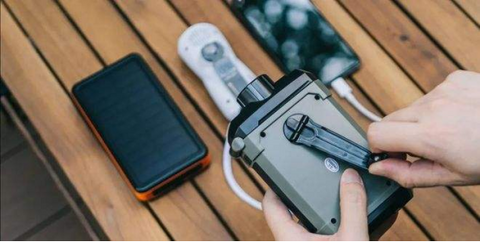
5. Portable solar panels are generally lighter in weight than hand-cranked chargers, so solar panels are more suitable for backpacking and camping.
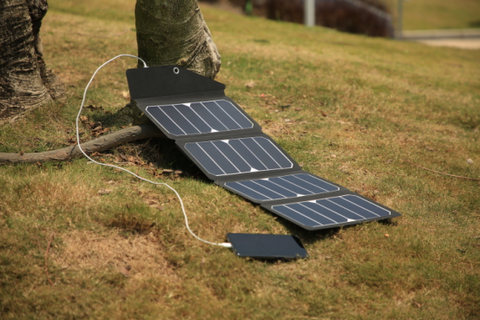
Third, the advantages and disadvantages of hand generators:
1.Advantages of hand crank generator:
The biggest advantage of the hand-crank charger is that you don't need to consider the weather or sunlight. It can be used wherever you go. All you need to do is to constantly crank the handle. Another point is that the hand-cranked generators on the market generally integrate functions such as radios and flashlights, and these functions will play a role in emergency situations.
At present, the newly designed hand-crank generators on the market generally contain a rechargeable power supply below 1000mAh, which can directly charge your mobile phone and other devices through a USB cable without a converter. There are at least two charging methods for rechargeable sources: USB charging and hand-crank charging.
2. Disadvantages of hand crank generator:
If you use the hand-crank charger a lot, you will feel exhausted after a while. Users feel that this low level of power generation efficiency is of little use. Especially when considering the relatively high power consumption of some electronic devices, manual power generation may not be the best choice. The capacity of the battery pack inside the hand-crank charger is very limited, because it cannot generate high-power electricity through hand movements.
Unlike windmills or hydroelectric power generation, you do not have enough strength and endurance to maintain a stable charge. Hand-crank chargers that integrate radios, flashlights, etc., they must have a battery pack for usability, so they are generally heavier than solar panels, which adds weight when backpacking and other outdoor activities .
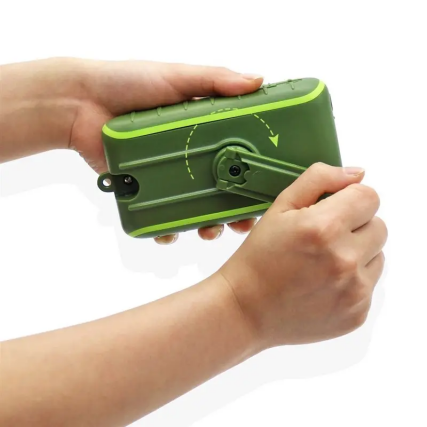
Fourth, the advantages and disadvantages of portable solar panels:
1.Advantages of portable solar panels:
Portable solar panels seem to have become the darling of camping and hiking over the past few years, they are more reliable, durable, and more efficient than ever, and the photoelectric conversion efficiency continues to increase, but the cost continues to decline, which Undoubtedly a sign of a popular and mature technology. The great thing about portable solar panels is that as long as you put them in the sun, you don't have to worry about them. You can also hang a portable solar panel on the back of your backpack while hiking, so you can get power on the go. Due to their very compact design, some also feature foldable flexible thin-film solar material to make portability even more convenient. Plus, portable solar cells are lightweight, durable, and don't overheat.
2. Disadvantages of portable solar panels:
But solar chargers have their limitations, and the amount of power they generate, and how much amperage they generate, is largely dependent on the surrounding weather conditions. They don't generate electricity at night and are significantly less efficient on cloudy or cloudy days. If it's not outdoors in sunny weather, it's almost useless, and this is the biggest shortcoming of portable solar panels. Of course some solar panels are designed to take advantage of the UV rays that pass through the clouds, but even then, on rainy days, they can only get around 20% of their maximum power output during the day.
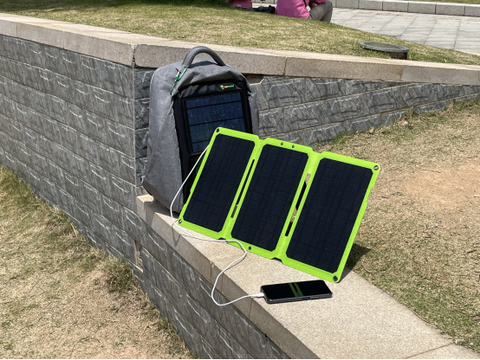
Fifth, how to choose:
Hand generators and portable solar panels are both excellent survival tools, each with their own advantages and disadvantages. As for how to choose, the key depends on the actual use environment.
Solar panels are better if you have access to sunlight throughout the day, and a hand-crank power charger is more practical if you're indoors, as a survival emergency reserve.
Hand generators and portable solar panels are both excellent survival tools, each with their own advantages and disadvantages. As for how to choose, the key depends on the actual use environment.
Solar panels are better if you have access to sunlight throughout the day, and a hand-crank power charger is more practical if you're indoors, as a survival emergency reserve.
For long-term hiking and crossing, most people will choose portable solar panels. Many portable solar panels are designed for outdoor use. They are designed to be sturdy, durable, dustproof, shockproof, and waterproof. They are very suitable for outdoor daily power supply and emergency situations.
Of course, in outdoor activities where you don't need to consider weight, having both devices is a more secure preparation.
The hand-crank charger is more commonly used to power electronic devices with weak current, and it is suitable for use as an emergency power supply in an emergency. Prepare this kind of hand-crank charger with integrated radio and flashlight for your family. When the time comes, you can better understand the latest weather changes and related danger information in your area.







Leave a comment